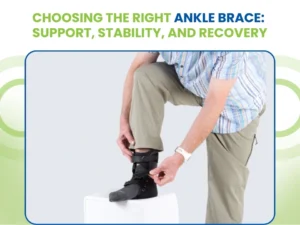Back pain affects millions of people; one way to get relief is through a back brace. If you have Medicare, you might wonder how often they will cover the cost of a back brace. Let’s take a look at the specifics of what Medicare covers when it comes to back braces so you can make an informed decision about whether or not a back brace is right for you.
Why Should You Consider a Back Brace With Medicare?
With Medicare-approved back braces, you can rest assured that your body is receiving the support it needs for injury recovery and overall wellness. These braces are especially helpful when living with chronic pain or injuries. They provide extra stability to vulnerable areas, such as your spine and muscles, so that healing can occur without worrying about excess strain. Give yourself a chance to recover fully with the comforting support of a quality brace!
Struggling with chronic back pain? A brace can provide much-needed support, helping to improve your posture and movements. Not only does this reduce the frequency of flare-ups from a persistent condition contributing to discomfort, but you’ll also notice less frequent episodes of severe back pain. You’re sure to experience greater relief with better posture and more stability!
What Does Medicare Cover When It Comes to Back Braces?

In general, Medicare will cover the cost of a prescribed medical device, such as a back brace, if your doctor determines that it’s medically necessary and provides an appropriate diagnosis code on the prescription. Medicare Part B typically covers 80% of the cost after you’ve paid your deductible.
Medicare Part B Coverage for Back Braces
Medicare Part B covers the cost of medically necessary back braces that meet specific criteria under their durable medical equipment (DME) prefabricated orthotics benefit. A prescription from a Medicare-approved physician must be obtained for the brace. It must fulfill certain characteristics such as being resilient, intended for an illness or injury, and having an expected life span of at least three years.
Original Medicare will cover 80% of the approved amount for your brace when obtained from a supplier enrolled in Medicare. This cost does not include a Part B deductible, yet if the provider and/or supplier is enrolled but “non-participating”, they can choose whether or not to accept the order, meaning you may be charged an unrestricted rate.
Medicare Part B can help you replace any of your covered durable medical equipment (DME) that is
- Worn out through use.
- That has been in your possession for its entire lifetime.
- They are so worn out that they can’t be fixed.
The minimum period considered to be a lifetime for DME is five years. The lifetime can vary depending on the type of equipment.
If you have signed up for a Medicare Advantage plan, like an HMO or PPO, your coverage will at least be equivalent to Original Medicare. Yet many Medicare Advantage plans offer additional benefits! The cost of a back brace depends on the specific plan that you’ve chosen. Don’t hesitate to call your provider if you’re in an Medicare Advantage plan and need assistance with coverage information — they’ll be happy to help!
How Often Will Medicare Pay for a Back Brace?
When it comes to how often Medicare will pay for a back brace, there are some limitations in place. Generally speaking, if your doctor determines that wearing a back brace is medically necessary to treat your condition, then Medicare will cover up to one back brace every five years. However, this does not necessarily mean that you can only wear one back brace over this period. Rather, it means that only one new or replacement back brace will be covered within five years. So it’s important to ensure your brace is durable and high quality.
Beneficiaries of Medicare are entitled to a new back brace every five years or if the item is worn out and no longer suitable for use before then. Although they will cover repair costs where possible, replacement items can only cost what it would a new one. After five years of use, or when worn out, anyone filing a Medicare claim must go through the process again with their doctor.
Read More: How Orthotics Help Reduce Back Pain?
What Kind of Back Brace Is Right for You?
The medically correct term for a back brace is lumbosacral orthosis (LSO). This supports the vertebrae and muscle tissue of the spine. Back braces are effective in providing relief from pain or injury due to improper posture or movement.
An LSO is an orthopedic brace that stabilizes and limits specific movements of the back, chest, and core. It’s used to treat a multitude of disorders with excellent results.
To find the optimal Medicare back brace for your needs, it’s best to talk with a physical therapist or medical practitioner who can provide reliable guidance based on your condition.
Regarding back braces, we can divide them into two distinct categories: hard and soft designs.
Rigid designs are utilized to treat more complex conditions like scoliosis and elastic ones (the most common) offer assistance for minor wounds or injuries. Many rigid and flexible back braces are available, and they all help with different spinal disorders or traumas.
Benefits of Wearing Back Brace
Back braces can be incredibly advantageous for seniors suffering from injuries or chronic pain. A medically-fitted back brace prescribed by a doctor can be an uncomplicated and safe solution for your condition. With the direction of your physician and by including particular exercises while wearing the device, a back brace has several advantages. These include:
- Assistance in the healing process after an acute injury.
- Reduces the chance of further injury.
- Stabilizes weak areas of the back directly following surgery.
- Helps control pain and discomfort.
- Supports weakened muscles.
- Provides more comfort and confidence in making movements like standing or sitting down.
- Promotes good posture.
Although back braces of superior quality can be expensive, Medicare may help you alleviate the financial burden by covering a portion or all of the cost.
The Bottom Line
Back braces are a common treatment option for many who suffer from chronic or acute lower back pain. If you have Medicare and are considering a back brace as part of your treatment plan, understanding what is covered and how often can help you make an informed decision about whether or not it makes sense financially — and medicinally — for your situation. In most cases, Medicare Part B will cover 80% of the cost (after deductible) but only up to one new or replacement device within five years. Knowing this information ahead of time ensures that you’re not faced with an unexpected financial burden down the road!
Artik Medical Supply carries high-quality back braces to meet several needs while being durable and customizable. Plus, our team will work with your doctor to verify your eligibility and can ship the brace directly to your home once approved. Contact us to check your eligibility for free today!








